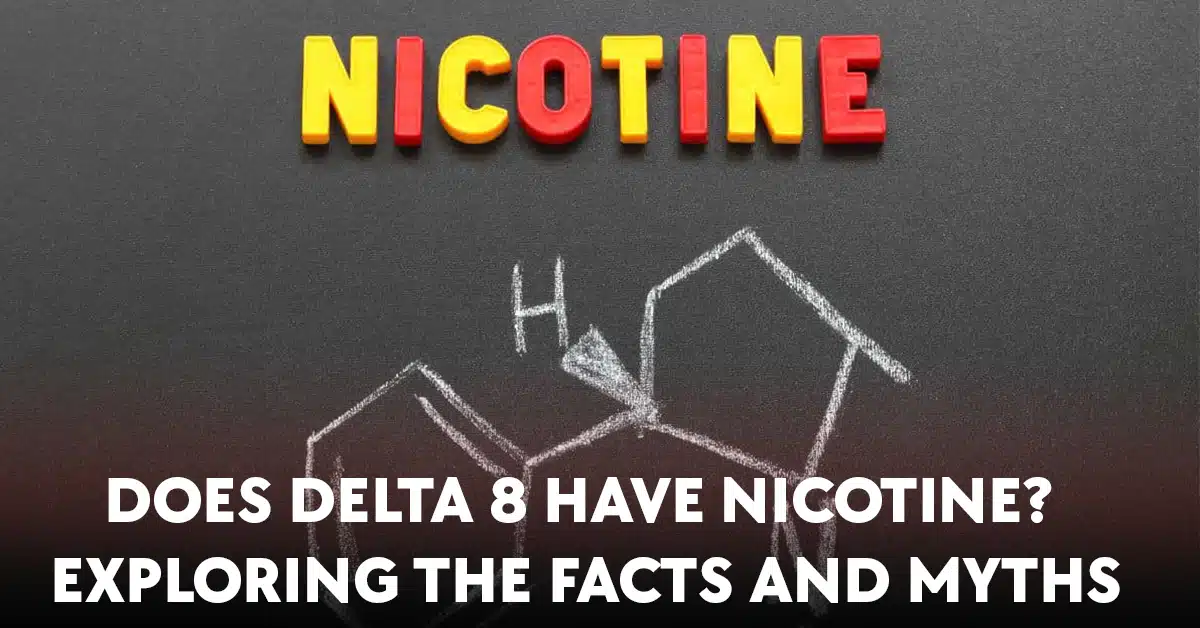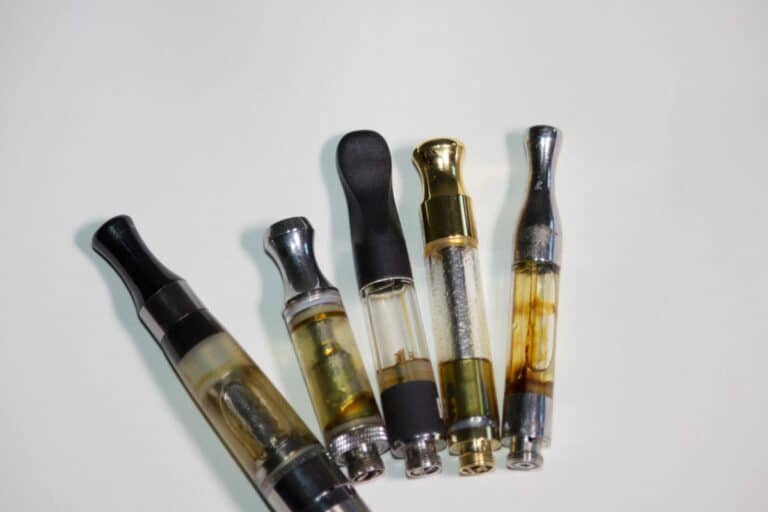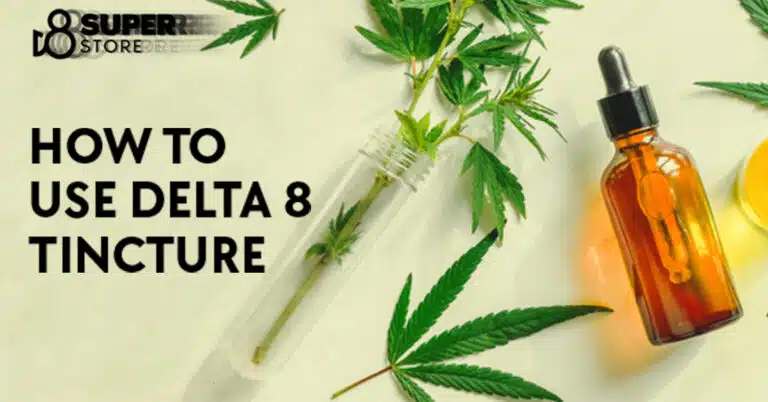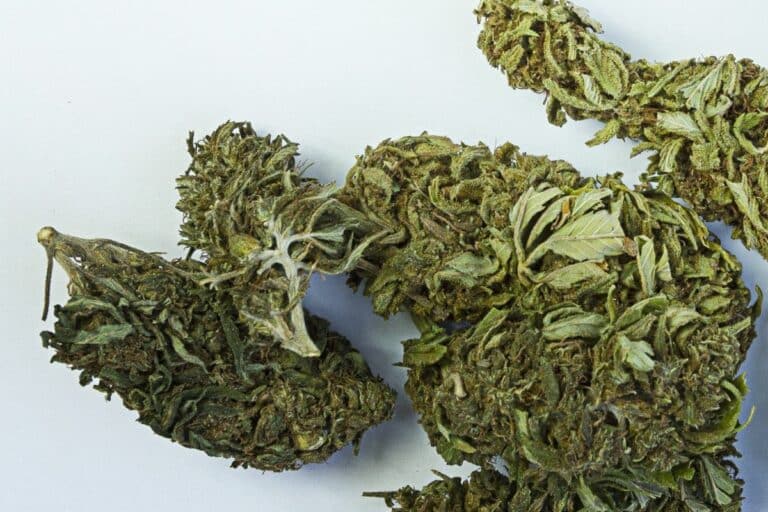Does Delta 8 Have Nicotine? Exploring the Facts and Myths
Delta-8 THC is quickly becoming a hot topic, known as the chill relative of delta-9 THC, marijuana’s more potent and well-known THC family member. The burning question on everyone’s lips is: Does it contain nicotine? Nicotine, the nasty stuff in cigarettes, isn’t doing our health any favors, leading to addiction and a bunch of other issues.
It is important to clarify that delta-8 THC and nicotine are two separate compounds. Delta-8 THC is a cannabinoid found in the cannabis plant, whereas nicotine is an alkaloid derived from the tobacco plant. The two substances have distinct chemical structures, effects on the body, and methods of consumption. Therefore, delta-8 THC products do not naturally contain nicotine unless intentionally combined in certain formulations.
Key Takeaways
- Delta-8 THC and nicotine are separate compounds, with delta-8 being a cannabinoid and nicotine an alkaloid.
- Delta-8 THC products do not naturally contain nicotine.
- Knowing the ingredients in delta-8 products is crucial for understanding their effects and potential health risks.
Delta-8 THC and Nicotine Comparison
Understanding Delta-8 THC
Delta-8 THC is a naturally occurring cannabinoid found in the cannabis and hemp plants. It is a minor component that offers a unique combination of effects compared to its more well-known counterpart, Delta-9 THC. Delta-8 THC is known for its milder psychoactive effects, offering a more relaxed and less anxious experience for users. The process of extracting Delta-8 THC from hemp or cannabis plants can be complex, but it has risen in popularity due to its potential benefits and legal status in some regions.
Cannabinoids like Delta-8, Delta-9, and CBD interact with the body’s endocannabinoid system, affecting various physiological functions. Although Delta-8 THC has gained attention in recent years, research is still limited compared to more well-established cannabinoids like CBD and Delta-9 THC.
Understanding
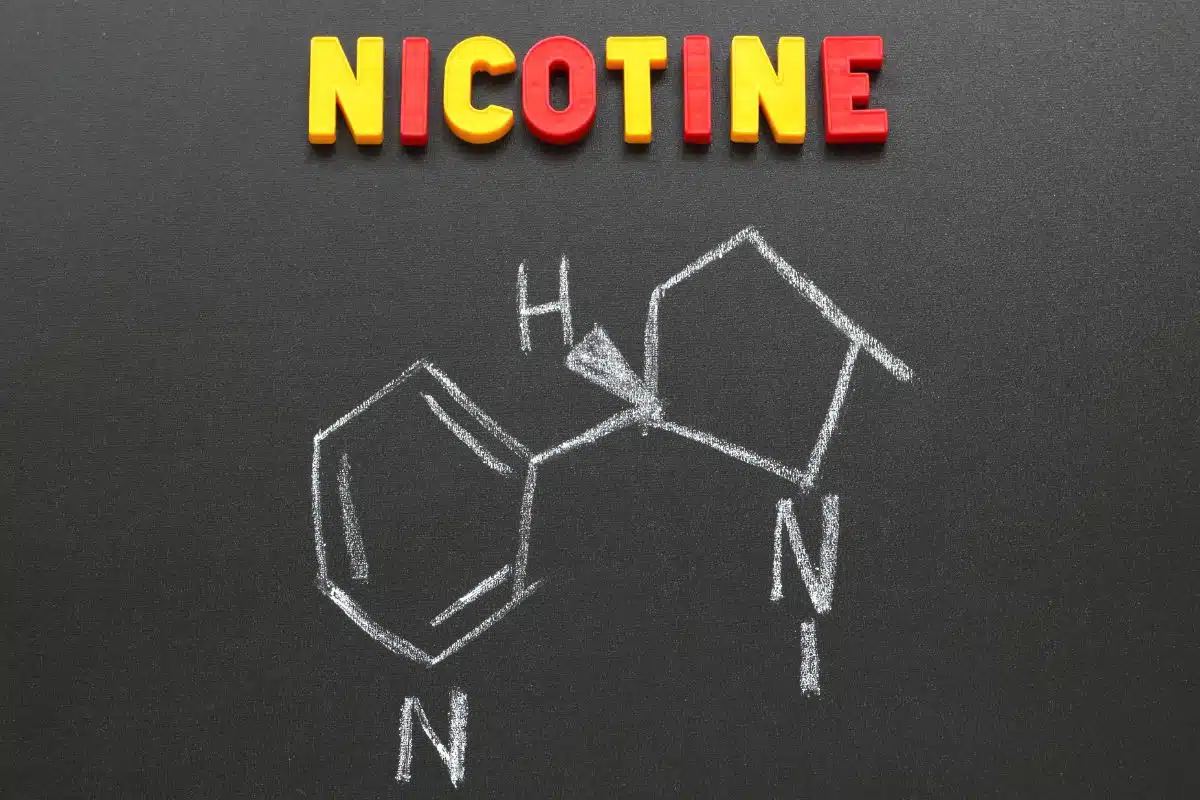
Nicotine is an alkaloid found naturally in tobacco plants, and it’s the primary reason tobacco products are so addictive. When comparing nicotine to Delta-8 THC, it’s important to consider the different methods of consumption, effects, and overall experience. While Delta-8 THC may be consumed through vaping, edibles, or tinctures, nicotine is mainly ingested through smoking or vaping tobacco.
The psychoactive effects of nicotine differ significantly from those of Delta-8 THC. Nicotine is a stimulant and can impact the central nervous system, leading to increased alertness, concentration, and heart rate. Conversely, Delta-8 THC’s effects are generally linked to relaxation, mild euphoria, and reductions in anxiety or pain.
It’s essential to understand that Delta-8 THC and nicotine are separate compounds with distinct effects. Delta-8 is a cannabinoid derived from natural sources like cannabis and hemp plants, while nicotine is an addictive compound found in tobacco plants. Given their differences, it’s unlikely to find Delta-8 THC products containing nicotine or vice versa.
Legality and Availability
Legality of Delta-8 THC
Delta-8 THC, a psychoactive compound found in cannabis plants, has gained popularity because of its relatively mild effects compared to its more well-known cousin, Delta-9 THC. Its legality, however, remains a point of discussion. The legal status of Delta-8 THC in the United States primarily comes from the 2018 Farm Bill, which legalized industrial hemp and its derivatives, as long as the THC content remains below 0.3%.
This opened a window for Delta-8 THC products derived from hemp, which many producers and sellers argue falls under the legal umbrella. However, the Drug Enforcement Administration (DEA) issued an interim final rule in 2020, stating that all synthetically derived tetrahydrocannabinols remain Schedule I controlled substances, arguably including Delta-8 THC when derived through specific processes. This has led to a confusing and often controversial legal status for Delta-8 THC in various states.
As of July 2023, Delta-8 THC is fully legal in some states, while in others it faces restrictions or is completely banned. It’s crucial to be aware of your state’s Delta-8 THC regulations before considering its use.

Legality of Nicotine
Nicotine, the addictive substance found in tobacco products, is a legal stimulant regulated by laws pertaining to the sale, distribution, and marketing of tobacco products. In the United States, the Food and Drug Administration (FDA) oversees the regulation of nicotine-containing products under the 2009 Family Smoking Prevention and Tobacco Control Act.
The legal age for purchasing nicotine products varies from state to state, with most setting a minimum age of 18 or 21. The FDA implemented a federal ban on the sale of tobacco products to anyone under the age of 21 in 2019.
While Delta-8 THC and nicotine are both regulated substances, it’s essential to note that Delta-8 THC products typically do not contain nicotine. The two compounds are found in different plants, with Delta-8 THC originating from cannabis and nicotine from tobacco. Consequently, when considering the legality and availability of Delta-8 THC, it’s critical to separate it from associations with nicotine.
Health Benefits and Risks
Delta-8 THC is a lesser-known cannabinoid found in the cannabis plant that has gained popularity for its potential therapeutic benefits. While it is structurally similar to Delta-9 THC, the psychoactive compound in marijuana, Delta-8 tends to produce milder intoxicating effects. This compound does not contain nicotine, but it is essential to consider both its potential health benefits and risks.
One of the health benefits of Delta-8 is its potential to help with anxiety. Some users have reported experiencing a calming effect when consuming Delta-8, which could be valuable for people who suffer from anxiety disorders. Additionally, users have described Delta-8 as providing a more manageable and less overwhelming experience than Delta-9 THC.
In terms of public health implications, Delta-8 may offer a safer alternative to those who seek the therapeutic effects of cannabis without the strong psychoactive properties of Delta-9 THC. This could be particularly beneficial for individuals who are sensitive to THC or have adverse reactions to its intoxicating effects.
However, there are also health risks associated with Delta-8 THC consumption. As a psychoactive compound, it may still produce confusion or adverse effects in some users, especially when consumed in high doses. Furthermore, there is limited research on the long-term effects of Delta-8 THC consumption, leaving many potential risks unknown.
Various methods of Delta-8 consumption are available, such as vaping concentrated formulations or using edibles and tinctures. The choice of method may impact the intensity and duration of the effects, so it is crucial for users to be mindful when selecting their preferred method.
In conclusion, while Delta-8 THC may offer some potential health benefits for anxiety relief and providing a gentler experience compared to its Delta-9 counterpart, it is essential to remain cautious and consider the potential risks. More research is needed to understand its long-term effects and safety fully.
Methods of Consumption

Delta-8 THC Consumption Methods
Delta-8 THC is a popular compound derived from cannabis and can be consumed in various ways. One of the most prevalent methods is through vaping. Delta 8 disposable vapes are pre-filled devices that enable users to enjoy delta-8 distillates on-the-go. Vape cartridges containing different THC compounds, such as THCa and THC-O, are also available for a revitalizing wellness experience.
Another popular form of Delta-8 THC consumption is edibles. Delta 9 gummies are an example of delicious and easy-to-consume products that offer the desired effects. Edibles allow for a slower release of the compound into the bloodstream, providing lasting effects compared to smoking or vaping.
Nicotine Consumption Methods
For nicotine intake, there are various methods, with the most common being through smoking cigarettes or joints. This method introduces nicotine into the bloodstream via the lungs, where it quickly travels to the brain, producing the stimulating sensations associated with nicotine.
Vaping has also become a popular alternative for consuming nicotine, as it allows individuals to avoid harmful combustion by-products associated with traditional smoking. Some disposable vape pens can even be filled with nicotine-based e-liquids, making them versatile devices.
Another way to consume nicotine is through smokeless tobacco products, such as chewing tobacco and snuff. These products are placed inside the mouth, allowing for the nicotine to be absorbed through the mucous membranes in the mouth and throat.
It is essential to note that Delta-8 THC and nicotine are entirely different compounds. Delta-8 THC is a cannabinoid derived from the cannabis plant, while nicotine is an alkaloid extracted from the tobacco plant. Their consumption methods are similar in some cases, like vaping, but the two substances create different physiological effects.
Product Quality and Safety Concerns
Delta-8 THC is a minor cannabinoid found in the cannabis plant, which has gained popularity due to its milder psychotropic effects compared to Delta-9 THC, the primary psychoactive component in marijuana. As Delta-8 THC products, such as vaping oils and edibles, become increasingly popular, concerns about product quality and safety have arisen.
A key issue with Delta-8 THC products is the lack of regulation and standardized quality control measures. The FDA has not yet established guidelines for the production and sale of Delta-8 THC products, leaving the market open to potential contaminants and inconsistencies in manufacturing processes. This can result in products that may contain harmful impurities, such as heavy metals, residual solvents, or synthetic cannabinoids.
Furthermore, as Delta-8 THC is often derived from CBD, it is essential to consider the quality of the starting material. Both marijuana and hemp-derived CBD products can vary in quality depending on the cultivation and processing methods used. Factors such as pesticide and herbicide residues, mold, and other contaminants can affect the final Delta-8 THC product’s safety and efficacy.
It is also essential to consider the potential risks associated with inhaling Delta-8 THC through vaping, as not enough research has been conducted on the long-term effects of inhaling the compound. The lack of studies on Delta-8 THC’s effects, particularly when vaped, warrants caution for consumers using these products.
In the absence of federal regulation, some states have taken steps to impose quality control and safety measures for cannabis and CBD products. However, these regulations vary from state to state, making it crucial for both producers and consumers to be aware of their local laws and guidelines.
To ensure product safety and efficacy, consumers should opt for reputable brands that provide third-party lab testing results and use established manufacturing processes. Additionally, staying informed about the latest research on Delta-8 THC can help users make informed decisions while using these products.

Audience and Application
Delta-8 THC is a cannabinoid found in hemp and cannabis plants that has gained popularity for its psychoactive effects, albeit less potent than the more well-known Delta-9 THC. Many people wonder if Delta-8 has nicotine, as both substances are found in vape products. It is essential to understand the differences between Delta-8 and nicotine to ensure the safety and intended effects for different audiences.
Delta-8 THC does not naturally contain nicotine, as they are distinct compounds. Delta-8 is found in hemp and cannabis plants, while nicotine is an alkaloid found in tobacco plants. However, some vape products may combine the two substances, so consumers need to be cautious and read product labels carefully to understand what they are consuming.
The primary audience for Delta-8 THC products are adults, as it is psychoactive and may be subject to age restrictions similar to recreational cannabis use, depending on jurisdiction. It is crucial to keep Delta-8 out of reach of children and ensure it doesn’t appeal to younger audiences.
When it comes to the application of Delta-8 THC, it interacts with the endocannabinoid system in humans, primarily targeting CB1 receptors in the nervous system and CB2 receptors in immune cells. These receptors are responsible for regulating various functions in the body, such as mood, appetite, pain, inflammation, and more. Delta-8 THC’s interaction with CB1 and CB2 receptors contributes to its effects, including potential therapeutic benefits and psychoactive attributes.
In summary, Delta-8 THC does not inherently contain nicotine, but some vaping products may combine them. The target audience for Delta-8 is adults, and the safety and proper use should be emphasized to prevent potential risks. Understanding the differences between Delta-8 THC and nicotine is vital for responsible consumption and making informed choices.
User Experiences and Resources
Delta 8 THC is a compound that has gained popularity for its mild psychoactive effects compared to delta 9 THC, the primary psychoactive compound in cannabis. User experiences with Delta 8 vary, but some report a more subtle “high,” clarity and focus, and less anxiety compared to traditional Delta 9 THC products. Nicotine, a separate stimulant found in tobacco products, is not typically present in Delta 8 products. However, users should always check the label and be aware of the ingredients in any vaping product they consume.
Reddit forums provide a platform for users to share their experiences with Delta 8, often discussing comparisons with Delta 9 THC and tips on vaping techniques. Some individuals have reported mild adverse effects, such as dizziness or headaches, while a few cases required hospitalization due to severe reactions. These instances emphasize the importance of using caution when trying new substances, even in relatively potent forms like Delta 8 THC.
In New York, Delta 8 THC products have undergone scrutiny from the government in response to concerns about the rapid growth and accessibility of vaping technologies. This has prompted a push for increased regulation and compliance measures surrounding the sale and distribution of Delta 8. It is crucial for users to source trustworthy and compliant products, ensuring that they are accurately labeled, tested, and free from dangerous additives.
Regarding potency, Delta 8 THC is considered less potent than its Delta 9 THC counterpart. The intensity of the effects can vary depending on the individual and the method of consumption, with some users finding that the experience is as intense as Delta 9 THC while others describing mild or even pleasant experiences. Ultimately, the overall experience may depend on personal sensitivities, consumption methods, and product quality.
In conclusion, Delta 8 THC is an alternative to traditional Delta 9 THC products that offers a generally milder and potentially beneficial experience for users. It is crucial for individuals to research and understand the compound, as well as ensure a trustworthy source for any products they consume. The Reddit platform provides an accessible resource for user experiences and information, and individuals are encouraged to take caution and educate themselves about the potential risks and benefits associated with Delta 8 THC use.
Frequently Asked Questions
Does Delta 8 THC contain any nicotine?
No, Delta 8 THC does not contain nicotine. Delta 8 THC is a cannabinoid found in the cannabis plant, while nicotine is a substance found in tobacco plants. They are distinct chemical compounds with different effects and origins.
Can Delta 8 products cause a positive drug test?
Yes, it is possible for Delta 8 THC products to cause a positive drug test. Many drug tests screen for THC, and Delta 8 THC is a form of THC. While it may be less potent than its more well-known counterpart, Delta 9 THC, its molecular structure is still similar, potentially leading to a positive result on a drug test.
Is it safe to consume Delta 8 regularly?
Delta 8 THC has been reported to produce similar but milder effects compared to Delta 9 THC, and research on its safety is limited. As with any substance, it is essential to approach Delta 8 consumption with caution, especially if you are new to it or have existing health concerns. Consulting with a healthcare professional or a trusted source of information is always a good idea before starting regular consumption.
What are the long-term effects of using Delta 8?
There is limited research on the long-term effects of Delta 8 THC. However, as it is a form of THC, it may share some of the risks associated with Delta 9 THC use, such as impaired judgment, decreased concentration, and memory issues. More research is needed to understand the specific long-term effects of Delta 8 THC.
What are the risks associated with Delta 8 vaping?
Delta 8 vaping shares some risks with general vaping, such as potential lung damage from inhaling propylene glycol or other chemicals found in vape products. There is also a risk of consuming high amounts of Delta 8 THC through vaping, as concentrated formulations are commonly used, which could lead to stronger effects and potential negative consequences. Furthermore, vaping may also expose users to contaminants if the product is not properly manufactured or regulated.
How do Delta 8 gummies differ from other Delta 8 products?
Delta 8 gummies are a type of edible that provides a convenient and discreet way to consume Delta 8 THC. They typically have a slower onset of effects compared to inhalation methods like vaping, as they are processed through the digestive system. The duration of effects may also be longer with gummies compared to other forms of consumption. However, dosages in gummies can vary, so it is essential to read the product label and start with a low dose to understand your tolerance and reaction to the edible.

